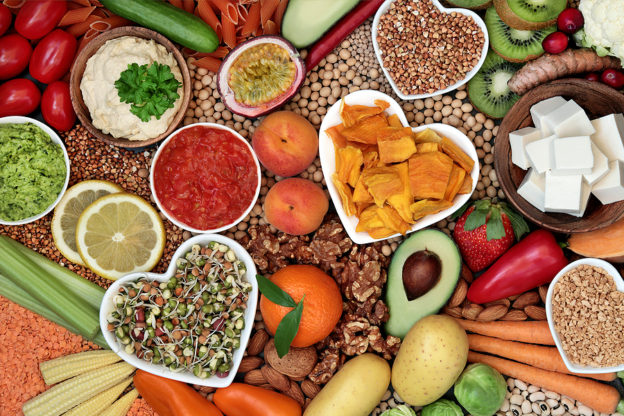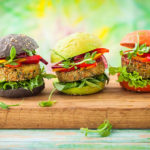By David Blyweiss, M.D., Advanced Natural Wellness
April 2, 2021
Covid has changed the way we eat. It had to.
You see, back when we didn’t have a potential life saving injection available, it didn’t take very long for people to realize that good nutrition and wholesome foods with supplementation when appropriate were some of the only tools in their arsenal to boost their immune systems and help fight against Covid-19.
As a result, a lot of people have become much more conscious about what they’re eating. The concept of “food as medicine” is finally going mainstream. And more and more people are joining the movement.
They are eating more antioxidant-rich plant-based foods that are loaded with vitamins and other nutrients. At the grocery store, they are choosing organic produce over commercial. Fermented foods that support the gut microbiome, where most of your immune system lives, are making a comeback.
If you’ve started adopting a new eating style that includes these types of foods, you may be wondering about a few things:
Open your arteries, improve blood flow for a new health miracle...
Did you know your circulatory system has over 60,000 miles of arteries, veins and other blood vessels, if stretched end to end?
But as you age, your blood vessels undergo changes, which may cause them to stiffen, thicken and get clogged.
GOOD NEWS! Doctors have now identified a “Miracle Molecule” inside your arteries that helps OPEN your arteries and IMPROVE blood flow.
It’s what Dr. Valentin Fuster calls it, "One of the most important discoveries in the history of cardiovascular medicine."To you, that means...
- Healthy blood pressure
- Sharper mind and memory
- Skyrocketing energy and muscular strength
- Increased pleasure and passion in the bedroom
- Improved circulation to every cell and organ in your body
Go here to discover a new natural way to significantly boost the levels of this miracle molecule in YOUR body NOW!
Where does meat come into play? Should I cut it out altogether? If I eat little or no meat, where will I get my protein from?
What to Eat Instead of Meat
Meat doesn’t need to be at the center of your plate at every single meal. In fact, I recommend you only make 15% of your diet contain meat. The other 85% should be whole plant-based foods.
You can easily satisfy the rest of your protein needs with a variety of natural, high-protein foods.
I add pulses like beans, peas and lentils to my meals. These are all low-fat sources of protein and fiber, so they aren’t fattening. Put them in soups, make bean dip, use them to top your salads or make your own chickpea hummus.
And nuts… I love nuts! I eat a handful of nuts every single night. And there are so many different types of high-protein nuts to choose from; almonds, pistachios, walnuts and more. (Remember, there are whole species of animals that survive just on nuts, like squirrels and chipmunks!)
The World's Quickest Solution for Ending Prostate and Urinary Misery
This has recently been revealed to be one of the only real breakthroughs in prostate health.
The seeds of a strange fruit (sometimes called "Chinese Apples") hold powerful phytonutrients that are a revolution in prostate health.
In fact, UCLA and Veterans Administration research have now proved this to be true.
Not only that, but it may be the worlds quickest solution for ending prostate misery.
Simply stated, these phytonutrients represent a huge step beyond beta sitosterol, saw palmetto, and other phytosterols alone.
Simply click HERE if you want to have fast prostate relief...restful, uninterrupted sleep...no more constant "urges to go"...enhanced virility...and optimal prostate support for life.
Just a handful of nuts has such incredible health benefits that everyone should be eating more of them.
Seeds, too. There is a lot of energy and protein in seeds. After all, a seed has to grow a whole new plant, right? Toss them into your yogurt. Blend them into smoothies. Use them to top your salads and veggies.
Eggs are another excellent source of protein. It’s a myth that they’re bad for you. But it’s a good idea to keep your eggs intact (not breaking the yellows) to keep the cholesterol in the eggs from oxidizing. They are much healthier if you prepare them over easy, over well, poached or boiled.
Pastured eggs are the kind that I buy. They are, by far, the healthiest eggs you’ll find today.
Of course there’s always fish. I recommend cold-water, wild-caught fish. Cold water species aren’t just high in protein, they have a lot more omega-3 fatty acids than other fish. The omega-3s are what allow the fish to bend its body and swim. The colder it is and the deeper they swim, the more omega-3 fatty acids they make.
Among other things, this is one of the reasons why I’m not a big proponent of farmed fish in pools that aren’t cold. They just don’t generate the omega 3s, so you don’t get enough omega 3s when you eat them.
Beware of these Protein Sources
Grains are inherently inflammatory. So I’m not a huge whole grain person. And if they have glyphosate sprayed on them, they’re poisonous.
Glyphosate is used not only for the GMO crops it was developed for but for weed control and as a dessicant to improve drying time in some grains, even the organically grown wheat. When you eat these glyphosate poisoned grains, awful things happen to the most basic and critical metabolic processes in your body; from disrupting your gut microbiome and B vitamin and neurotransmitter production to increasing rates of cancer, specifically tripling the risk of a type of non-Hodgkins lymphoma called lymphocytic lymphoma.
If you feel the need to ocassionally include grains in your diet, I personally recommend at least sticking with gluten-free organic grains. I’m not crazy about the mouth feel of quinoa, but it’s a good source of protein. Millet and buckwheat are two other agreeable options. The Deland Millet breads are some of the best tasting toast ever. And a bowl of cream of buckwheat salted and sugared just right with fruit and a handful of crushed nuts of choice…mmmh, you will find the time to make it again after the first time.
Dairy isn’t your best choice for protein. Remember, we’re not baby cows. And the fact is, dairy is an allergen. Plus, today’s commercial dairy products are filled with drugs, hormones and antibiotics. So you’re better off to avoid them.
When you do choose to eat or drink dairy, make sure it’s an organic brand. It’s the safest way to go. But, the recent dairy free offerings are quite delicious with more choices now matching our taste buds from cheese to cream cheese to yogurts
And keep in mind that, while it’s always a good idea to keep your meat consumption low, there are ways to make consuming meat “safer”. I wrote all about it at the end of last year, so check it out.
SOURCES:
OPN State of Organic Produce 2020.
Marsh KA, et al. Protein and vegetarian diets. Med J Aust 2013; 199 (4): S7-S10.
Antunes AEC, Vinderola G, Xavier-Santos D, Sivieri K. Potential contribution of beneficial microbes to face the COVID-19 pandemic. Food Res Int. 2020;136:109577.
Samsel A, et al. Glyphosate pathways to modern diseases V: Amino acid analogue of glycine in diverse proteins. Journal of Biological Physics and Chemistry. Volume 16(June):9-46







